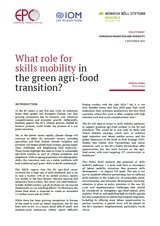What role for skills mobility in the green agri-food transition?
Read the full paper here.
As the EU enters a new five-year cycle, its ambitious Green Deal targets and European Climate Law face growing uncertainty due to concerns over industrial competitiveness and economic growth. Additionally, backlash against the EU’s climate policies, fuelled by farmers’ protests, could hinder the promise of a just green transition.
Yet, as the planet warms rapidly, climate change will continue to affect EU economic sectors, including agriculture and food. Greater climate variability and extremes will impact global food systems, posing supply chain challenges and heightening food insecurity. These trends highlight the need to invest in sustainable agri-food systems as part of climate mitigation and adaptation. With an ageing population and demographic shifts, this transition rests on a stable workforce with both traditional and ‘green’ skills in the EU and beyond.
The OECD reports that the EU agri-food sector currently has a high rate of skills mismatch and is set to lose a further 13% of its skilled workers, mostly low-skilled, in the next decade.2 Beyond seasonal and temporary farm workers, the sector will need mediumto high-skilled workers, not all of whom can be sourced domestically or via reskilling efforts. Furthermore, the Green Deal alone is expected to create an estimated 2.5 million more jobs by 2030.
Contact: Hannah Goerlich.
